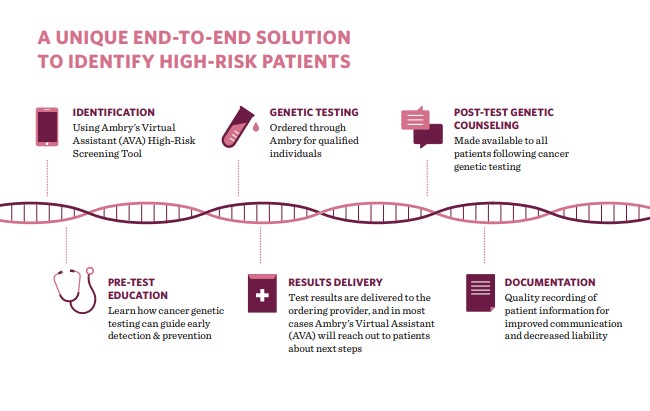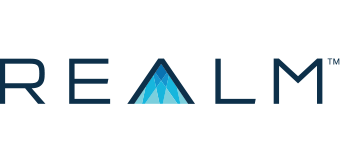CARE Increases Access to Genetic Testing
It’s estimated that 1 in 4 women[1] in the general population meet high-risk criteria for hereditary cancer genetic testing. At Ambry we believe that genetic testing is key to detecting and preventing disease in people who have a suspected inherited cancer risk. However, this important testing is often only offered by physicians and genetic counselors who have expertise in genetics. Ambry’s CARE Program™ (Comprehensive Assessment Risk and Education) helps all types of health care providers identify patients at high-risk and increases their access to genetic testing.

The CARE platform is a digital tool that provides a streamlined, end-to-end solution for doctors to provide risk screening and education on genetic testing, as well as facilitates test ordering, result reporting and access to genetic counselors. The tool integrates into their existing IT structure and workflow making it easy for them and their patients to benefit from the CARE program.
With a focus on improving patient outcomes, Ambry’s CARE program empowers health care providers and patients in several ways. First, early detection of genetic risk enables patients to undergo individualized cancer screening based on their specific cancer risk. Second, in some cases, genetic test results provide necessary information to tailor treatment recommendations if the patient does develop cancer. Finally, when a genetic mutation is identified, the patient’s family members can be appropriately tested and if needed, offered advanced cancer screenings.
The CARE Program is currently used by more than 1,000 health care providers, clinics and medical facilities. Since the CARE Program started in summer of 2020, we have seen great results. Over a half a million patients have been enrolled in the program, and approximately 75% of them completed their CARE risk assessment. In this general population of patients, 28% met established criteria for genetic testing. However, the real win for CARE is the number of high-risk patients that have been identified. To date, nearly 2,000 patients have discovered a high-risk hereditary cancer gene mutation and over 30,000 patients have been identified at high risk based on other factors and referred for advanced breast imaging screening such as MRI.
The CARE Program has primarily targeted hereditary cancer and will soon be expanded to new markets. In FY 2022, we plan to integrate the CARE Program into reproductive genetics, offering carrier screening and noninvasive prenatal screening (NIPT) at scale to patients.

The CARE team is excited about the future of the program and looks forward to further collaboration with the precision health initiatives that REALM is fostering. You can find more information about the CARE Program here.
[1] Nazareth S, Hayward L, Simmons E, Snir M, Hatchell KE, Rojahn S, Slotnick RN, Nussbaum RL. Hereditary Cancer Risk Using a Genetic Chatbot Before Routine Care Visits. Obstet Gynecol. 2021 Dec
CARE Increases Access to Genetic Testing

It’s estimated that 1 in 4 women[1] in the general population meet high-risk criteria for hereditary cancer genetic testing. At Ambry we believe that genetic testing is key to detecting and preventing disease in people who have a suspected inherited cancer risk. However, this important testing is often only offered by physicians and genetic counselors who have expertise in genetics. Ambry’s CARE Program™ (Comprehensive Assessment Risk and Education) helps all types of health care providers identify patients at high-risk and increases their access to genetic testing.
The CARE platform is a digital tool that provides a streamlined, end-to-end solution for doctors to provide risk screening and education on genetic testing, as well as facilitates test ordering, result reporting and access to genetic counselors. The tool integrates into their existing IT structure and workflow making it easy for them and their patients to benefit from the CARE program.
With a focus on improving patient outcomes, Ambry’s CARE program empowers health care providers and patients in several ways. First, early detection of genetic risk enables patients to undergo individualized cancer screening based on their specific cancer risk. Second, in some cases, genetic test results provide necessary information to tailor treatment recommendations if the patient does develop cancer. Finally, when a genetic mutation is identified, the patient’s family members can be appropriately tested and if needed, offered advanced cancer screenings.
The CARE Program is currently used by more than 1,000 health care providers, clinics and medical facilities. Since the CARE Program started in summer of 2020, we have seen great results. Over a half a million patients have been enrolled in the program, and approximately 75% of them completed their CARE risk assessment. In this general population of patients, 28% met established criteria for genetic testing. However, the real win for CARE is the number of high-risk patients that have been identified. To date, nearly 2,000 patients have discovered a high-risk hereditary cancer gene mutation and over 30,000 patients have been identified at high risk based on other factors and referred for advanced breast imaging screening such as MRI.

The CARE Program has primarily targeted hereditary cancer and will soon be expanded to new markets. In FY 2022, we plan to integrate the CARE Program into reproductive genetics, offering carrier screening and noninvasive prenatal screening (NIPT) at scale to patients.
The CARE team is excited about the future of the program and looks forward to further collaboration with the precision health initiatives that REALM is fostering. You can find more information about the CARE Program here.
[1] Nazareth S, Hayward L, Simmons E, Snir M, Hatchell KE, Rojahn S, Slotnick RN, Nussbaum RL. Hereditary Cancer Risk Using a Genetic Chatbot Before Routine Care Visits. Obstet Gynecol. 2021 Dec
